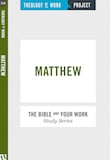What Is Righteousness? (Matthew 5:17-48)
Bible Commentary / Produced by TOW Project.jpg)
Jesus makes a startling statement in Matthew 5:20. “I tell you, unless your righteousness exceeds that of the scribes and Pharisees, you will never enter the kingdom of heaven.” Ordinary people in his day revered the apparent righteousness of the religious leaders and could not imagine ever matching them in their piety. Jesus shocks them by stating that entrance into God's kingdom was available only to those whose righteousness exceeded that of the scribes and Pharisees. Who, then, could be saved? The problem lay in equating righteousness with external piety, a common understanding of the word both then and now. But the word righteousness throughout the Bible (as noted above in the fourth beatitude) always denotes right relationships—with God and with people around us. This includes those in the workplace.
This becomes plain in the illustrations that follow. In Matthew 5:21-26, it is not enough not to murder someone; we must guard against harboring anger that leads to insults and broken relationships. We may feel anger, but the right way to handle anger is try to resolve conflict (Matt. 18:15-19), not to push the person away with insults or slander. Jesus is clear that a right relationship between you and your brother or sister is so vital that you should forego religious practices until you have cleared the matter between the two of you.
In the workplace, anger may be used to manipulate others. Or anger may overwhelm you because you feel unfairly treated. Deal with the issue: take the first step toward reconciliation, even though it may put you in a position of humility. Engaging in fair, open conflict resolution is the way of the new kingdom. Again, blessed are the peacemakers.








